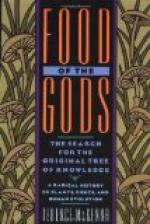Up to this point the operations described have taken place in the lands where cacao is produced. To watch the further processes in its development as an article of food, let us in imagination follow one of the shiploads of cacao on its sea journey from the far tropics to one of the countries of the old world, until the sacks of beans are finally deposited at a cocoa factory. An English factory, that of Messrs. Cadbury, at Bournville, affords an excellent illustration of its manufacture, not only because about a third of all the beans imported into this country are treated there, but also because this treatment is effected amid ideal surroundings. Half a century ago Messrs. Cadbury Brothers employed but a dozen or twenty hands, and until within the last twenty-six years the firm was established in the town of Birmingham. The need for greater accommodation for the rapidly growing business, and a desire to secure improved conditions for the work-people, led to the removal of the factory to a distance of about four miles south of the city. A number of cottages erected for the work-people in those early days became the nucleus of a great scheme which in the last few years has expanded into the model village of Bournville, a name taken from the neighbouring Bourn stream. Year by year the factory grew and developed, until the green hay-fields, with the trout stream flowing through them, became gradually covered with buildings. To-day the factory seems like a small town in itself, intersected by streets, and surrounded by its own railway. But the greenness of the country clings wherever a chance is afforded, ivy and other creepers adorning the brick walls, window boxes bright with flowers, and trees planted here and there; for no opportunity has been neglected of making the surroundings beautiful.
[Illustration—Black and White Plate: Bournville Cocoa Works: Office Buildings.]
Taking train from the city, glimpses can be caught, as we near our destination, of the pretty houses and gardens of the village, forming a great contrast to the densely populated district of Stirchley on the other side of the line. Stepping on to the station, we are greeted by a whiff of the most delicious fragrance, which is quite enough of itself to betray the whereabouts of the great factory lying beneath us, of which from this point we have a fairly good bird’s-eye view. Down the station steps, and a few yards up the lane to the left, with a playing field on one side, and on the other a plantation of fir-trees almost hiding the red brick and timbered gables of the office buildings, and we have arrived at the factory lodge. Looking through the open door down a vista of archways bowered in clematis and climbing roses, with an alpine rock garden at each side of the broad walk, we might almost imagine ourselves to be at the entrance to some botanical gardens. But a glance at the thousands of check hooks covering the inner wall of the lodge informs us that more than 2,400 girls pass in and out every day. The men’s lodge is at a separate gate.




